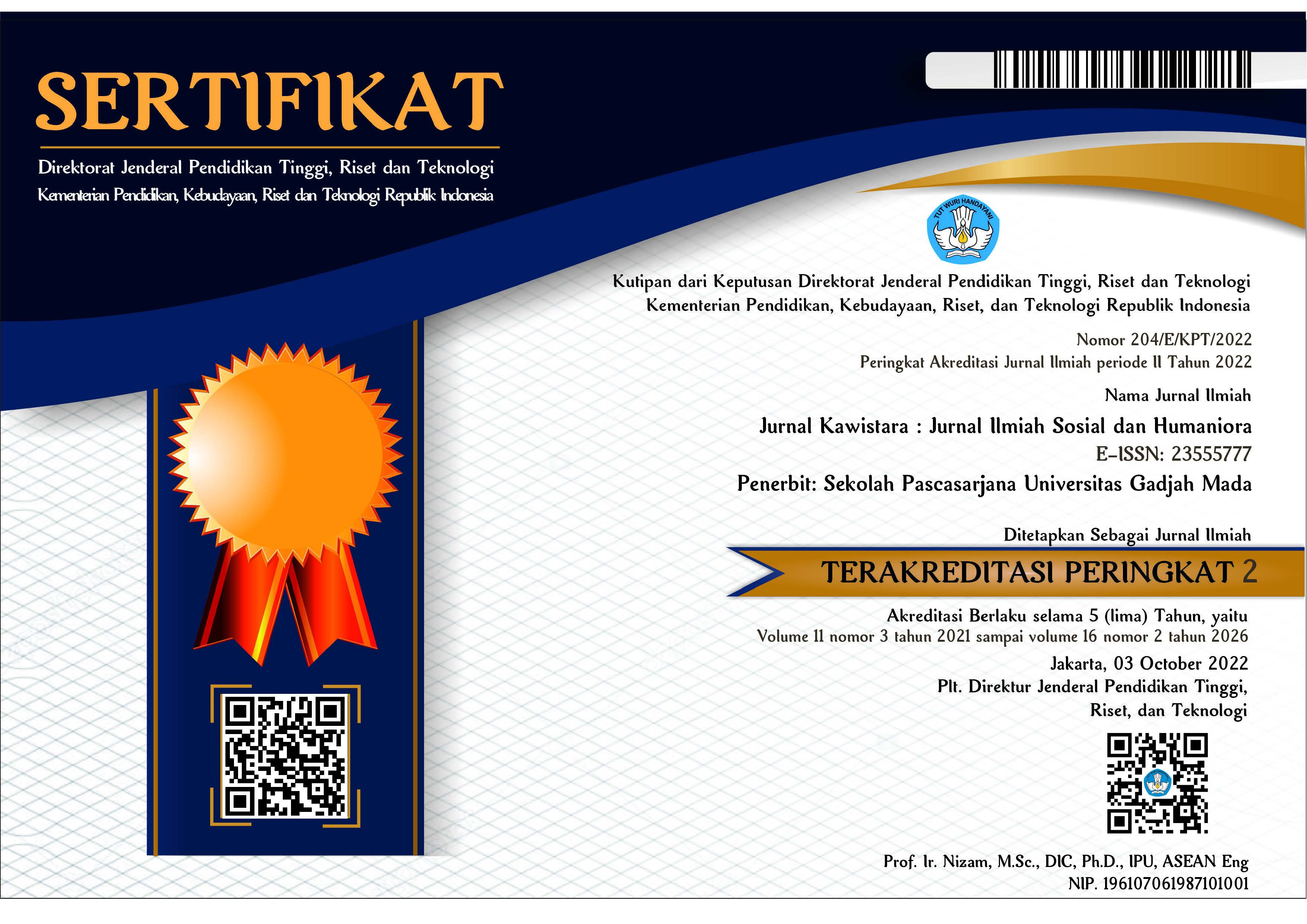INFLUENCE OF CONGRESS IN SUPPORTING ON ENVIRONMENTAL ISSUE IN RONALD REAGAN ADMINISTRATION
Fatkurrohman Fatkurrohman(1*)
(1) Prodi Diploma Pariwisata, Departemen Bahasa, Seni dan Managemen Budaya, Sekolah Vokasi, Universitas Gadjah Mada
(*) Corresponding Author
Abstract
This research aims to analyze the influence of the United States Congress in influencing the policies of the Ronald Reagan administration in ratifying the Montreal Protocol. This research uses one of the models proposed by Graham T. Allison, a bureaucratic political model. This model is used to analyze the political process associated with the bargaining position and compromise between the actors involved in the governments of Ronald Reagan, Congress and DuPont (the company). To understand how these actors play their role in the domestic political process, researchers use qualitative research by collecting data in the form of books, journals and other documents. Explorative methods are used to explore related argumentative basics related to the political process that occurs between the three actors. The result of this study shows that Congress in the era of the Ronald Reagan administration, especially in the House of Representatives is more dominated than the Democratic Party than the Republicans, while in the Senate during 1981-1989, the Democratic Party was only dominant in 1987-1989. The important three things in this research that all actors obtained their interests. Firstly, it is DuPont Company. It received benefits from CFC (Chlorofluorocarbon) changing such as HFC (Hydrofluorocarbon), HC (Hydrocarbon), and PFC (Perfluorocarbon). Secondly, it is Congress Agency. It which was dominated by the members of Democratic Party that stressing on environmental issues could reach their political program such as environmental protection. Thirdly, it is the Executive Agency. It gained benefits in saving of budget $503 million up to $2,8 billion for treating many diseases such as cortical cataract cancer, decrease of body immunity, and environmental problems.
Keywords
Full Text:
PDFReferences
https://www.thebalance.com/u-s-congress-definition-duties-effect-on-economy-3305980 (Accessed 23 July 2018)
https://fas.org/sgp/crs/misc/R44762.pdf (Accessed 23 July 2018)
Allison,T, Graham. 1971. Essence of Decision: Explaining the Cuban Missile Crisis. Boston: Little, Brown and Company.
Atherton, S, Cynthia, E. Joyce, Penner, Price,Colin, J.Jhon, Walton.1995. Climate Change and its Effect on Tropospheric Ozone in Wei-Chyung Wang , Atmospheric Ozone as a Climate Gas: General Circulation Model Simulations, Berlin: Springer with NATO Scientific Affairs Division.
Beder,Bader, 'Ecological Double Agents, www.uow.edu.au/~sharonb/agents.html. (Accessed 13 October 2016.)
Benedick,E, Richard. 2008. Science Inspiring Diplomacy: The Improbable Montreal Protocol in Twenty years of Ozone Dicline: Proceeding of the Symposium for the 20th Anniversary of the Montreal Protocol. Athena: Springer.
Fatkurrohman.2009. Pemanasan Global dan Lubang Ozon : Bencana Masa Depan: Yogyakarta. Media Wacana.
Gillespie, Alexander.2006. Climate Change, Ozone Depletion and Air Pollution: Legal Commentaries with Policy and Science Consideration. Leiden: Martinus Nijhoff Publishers
Hoffman, Matthew .2005. Ozone Depletion and Climate Change: Constructing GLOBAL Response. New York: State University of New York.
Kovats, Sari, Menne, Bettina, McMichael, Anthony, Bertollini, Roberto, and Soskolne, Colin. 2000. WHO Regional Climate change and stratospheric ozone depletion Early effects on our health in Europe, WHO regional publications. European series ; No. 88, Copenhagen.
Mardiyati,Tris. 2007. Himpunan Perjanjian Internasional Di Bidang Lingkungan Hidup. Jakarta:Kementrian Lingkungan Hidup
Muller,Rolf. 2012. Stratospheric Ozone Depletion and Climate Change, London: RSC publishing, Cambridge.
Ness, Immanuel. 2000. Enciclopedia of Interest Groups and Lobbyists in The United States, New York: M.E. Sharpe INC.
Seitz, S, Jhon, and Mitoff,D, Sally, Challenge of Enforcing the Montreal Protocol on Protection of Stratospheric Ozone. www.unep.org. (Accessed l13 July 2007).
Shull,A. Steven. 1999. Presidential Policymaking: an End of Century Assessment. London: M.E.Sharpe-Armork.
Reilley,K, William, Remarks at The Fourth Meetings of The Parties to the Montreal Protocol. http://remarks at the fourth meeting of the parties to the Montreal protocol EPA History US EPA.htm. (Accessed 27 July 2007).
Tsani,Burhan. 1990. Hukum dan Hubungan Internasional, Yogyakarta: Penerbit Liberty.
Velders, Guus, Duals Benefits of the Montreal Protocol: Protecting Ozone Layer and Climate. www.globalsecurity.org/security/library/congress/2007_h/070523-velders.pdf. (Accessed 25 August 2007).Article Metrics
Refbacks
- There are currently no refbacks.
Copyright (c) 2018 Fatkurrohman

This work is licensed under a Creative Commons Attribution-ShareAlike 4.0 International License.
Jurnal Kawistara is published by the Graduate School, Universitas Gadjah Mada.








